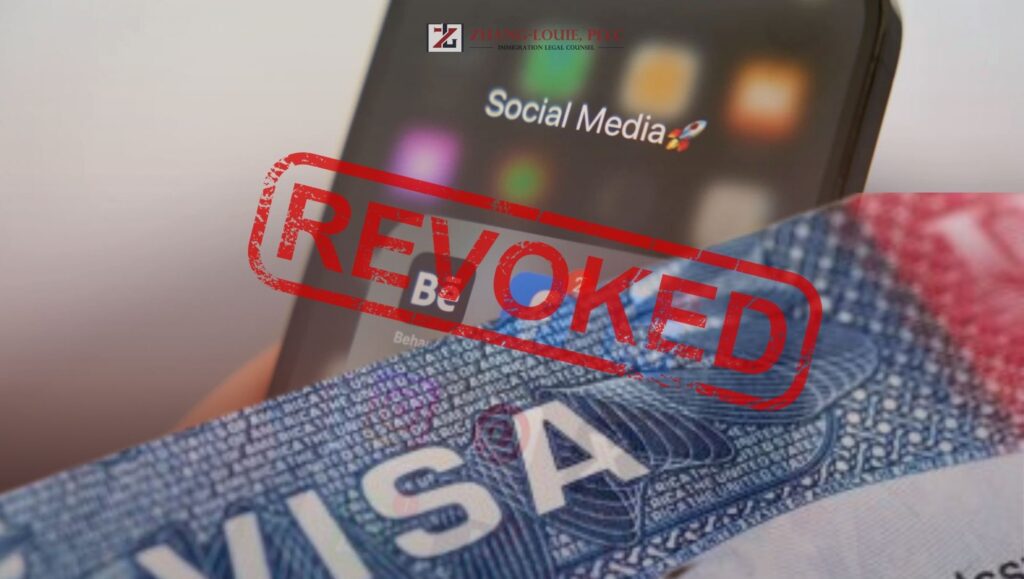
Navigating the U.S. immigration process has never been simple for international students. But in 2025, a new layer of complexity has been added—one that directly impacts F, M, and J visa holders. According to the latest Practice Alert from the American Immigration Lawyers Association (AILA), the U.S. Department of State (DOS) is implementing enhanced social media vetting and expanding the circumstances under which student visas may be revoked or denied. This shift comes amid growing concerns about national security and the integrity of the student visa program. The DOS has rolled out a policy update that empowers consular officers to scrutinize not only an applicant’s background, travel history, and academic intent but also their digital footprint. While social media screening isn’t new, what’s changed is the depth and the influence this review now has on visa decisions.
At Zhang-Louie PLLC, we’ve seen an increase in students reaching out with questions like: Can my private social media posts affect my visa? What if I posted something years ago that is now taken out of context? These are legitimate concerns, especially as we watch real-life examples unfold where students—many already enrolled in U.S. universities—are being flagged, delayed, or even having their visas revoked while in the United States.
The DOS has made it clear that consular officers are now instructed to review social media with a higher level of scrutiny. This doesn’t just mean public profiles. It can include any accessible information that, in the view of the officer, raises concerns about the applicant’s eligibility or intent. What’s particularly challenging is that the criteria are subjective. An applicant who keeps their profiles private, for instance, may be flagged not for anything they posted—but simply because officers interpret limited online presence as evasiveness. In contrast, something as simple as an old photo, a joke, or a post that references politically sensitive topics could be misunderstood when viewed without context. This approach was initially piloted in cases involving students affiliated with Harvard University but is now being applied more broadly. The trend shows that students from countries subject to heightened scrutiny—particularly China—are at greater risk. But it isn’t limited to any single nationality.
The application of INA section 214(b)—commonly associated with tourist visa denials—is now extending aggressively to student visas. Under this section, a visa can be denied if the officer is not “personally and completely satisfied” that the applicant intends to return home after completing their studies. Historically, students could reasonably expect that demonstrating admission to a legitimate U.S. institution, along with proof of funding and academic purpose, would satisfy the officer. Today, however, it’s not that simple. A social media post perceived as indicating permanent intent, political activism, or controversial affiliations can tip the balance toward a 214(b) refusal—even if the student meets all formal academic and financial requirements. Perhaps the most unsettling part of this policy change is that a visa can be revoked after it has been issued—even if the student is already inside the United States. Revocations typically come via email to the address the applicant provided to the Department of State, meaning some students don’t even realize there’s an issue until they try to travel, renew their visa, or check their status. A revoked visa doesn’t automatically cancel your current status while you’re physically in the U.S., but it can have serious consequences. It could lead to complications if you depart and try to return, or it could be used as a basis for removal proceedings if coupled with other allegations.
In our work, we’ve advised students that while there’s no perfect way to guarantee a visa outcome, preparation is critical. Reviewing your online presence isn’t about hiding anything; it’s about ensuring there is nothing that could be misunderstood. This includes double-checking public-facing posts and being prepared to explain any content that could appear confusing without context. But even more important than managing social media is being ready to demonstrate strong ties to your home country, clear academic goals, and a commitment to complying with the terms of your visa. For students with any prior immigration complications—such as a SEVIS termination, past overstays, or a visa denial—consulting with an experienced immigration attorney before travel or a consular interview has become not just advisable but essential.
At Zhang-Louie PLLC, we’ve guided countless students through complex immigration challenges, including responding to visa denials, preparing strong documentation for consular interviews, and helping those affected by SEVIS terminations or administrative processing. Our focus is on making sure students aren’t left in the dark and have a clear strategy to protect their future in the U.S. If you have concerns about your visa status, are preparing for an upcoming visa interview, or have received a troubling notice from the DOS, our team is ready to help you understand your options and take the right next steps.
GET IN TOUCH